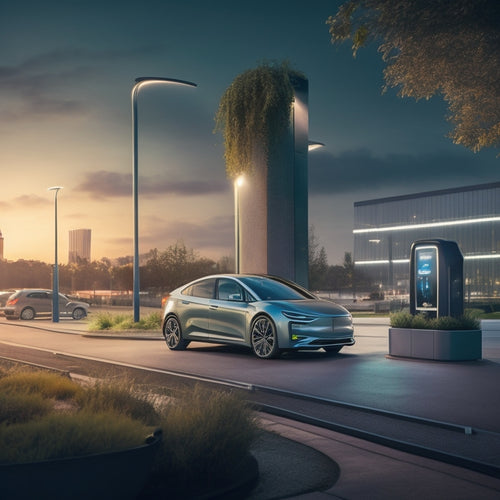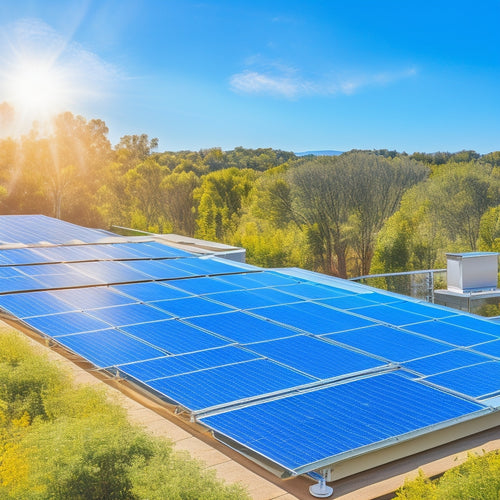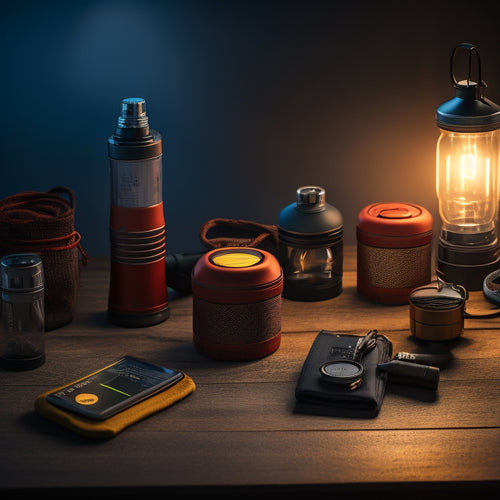
Best Home Energy Storage Systems for Independence
Share
You want a home energy storage system that provides independence from the grid, and reliability is essential. Look for systems with seamless integration with solar panels, minimal maintenance, and real-time monitoring for optimized usage and fault alerts. Top picks include Tesla Powerwall, LG Chem RESU, and Sonnen eco. When selecting a system, consider factors like battery lifespan, energy density, and installation requirements. As you investigate your options, you'll find that understanding battery capacity, charging and discharging mechanics, and system costs are vital for achieving energy independence - and there's more to examine to find the perfect fit for your needs.
Overview
- For maximum independence, choose systems with high energy density, like lithium-ion batteries, to minimize space requirements.
- Consider systems with advanced battery management systems for improved performance and longevity.
- Evaluate your energy needs to select the right battery capacity, ensuring sufficient power for essential appliances.
- Opt for systems with high charging efficiency to minimize energy loss and maximize storage capacity.
- Assess the total cost of ownership, including installation and maintenance, to ensure a strong return on investment.
Top Energy Storage System Picks
When considering home energy storage systems, selecting the right one can be an intimidating task, especially with the numerous options available in the market.
You're looking for a system that integrates seamlessly with your solar panels, providing efficient solar integration. You want a system that's reliable, durable, and requires minimal maintenance.
Look for systems with built-in maintenance tips, such as alert systems for faulty components or battery health monitoring. Many systems, like those from SimpliPhi Power, offer real-time monitoring to optimize usage.
Top picks include the Tesla Powerwall, LG Chem RESU, and Sonnen eco, which offer advanced features like smart grid functionality and backup power during outages.
Key Features to Consider First
Your home energy storage system's performance hinges on several critical features.
You'll want to reflect on the battery lifespan, which can range from 5 to 15 years or more, depending on the type and quality of the battery. A longer lifespan means fewer replacement costs and less waste.
Additionally, advanced battery management systems optimize charging and discharging for better performance, and high energy density maximizes power in limited space, ideal for small homes.
Installation requirements are another key factor, as they can impact the overall cost and complexity of the system.
You'll need to reflect on the space and environmental requirements for the system, as well as any necessary permits or inspections.
Battery Capacity and Type Matters
Battery capacity, measured in kilowatt-hours (kWh), directly impacts the system's ability to power your home during outages or peak energy usage.
You'll want to evaluate how much energy you need to power your essential appliances and devices. A higher capacity battery will provide more power, but it also increases the system's cost and physical size.
When selecting a battery type, it's important to assess the deep cycle battery options that suit your needs, such as flooded, AGM, or gel batteries, each with unique features and lifespans.
Lithium-ion batteries, like those from Tesla or LG, offer advantages like longer lifetimes and deeper discharge capabilities.
When comparing systems, look at the capacity comparison to determine which one best fits your needs. For example, a 10 kWh battery may be sufficient for small homes, while larger homes may require 20 kWh or more.
Choose a system that balances your energy needs with your budget and space constraints.
Charging and Discharging Explained
Now that you've determined the right battery capacity and type for your home energy storage system, it's time to understand how charging and discharging work.
Charging efficiency is essential, as it affects how much energy your system can store. Look for systems with high charging efficiency to minimize energy loss.
When it comes to discharging, you'll want to take into account the number of discharging cycles your batteries can handle. This determines how many times your batteries can charge and discharge before they start to degrade.
A higher number of discharging cycles means your system will last longer and provide you with more energy independence.
System Cost and ROI Analysis
Three key factors influence the overall cost of a home energy storage system: the type and capacity of the battery, the inverter and charger configuration, and the installation costs.
As you consider investing in a system, you'll want to weigh the initial investment against the long-term savings. While the upfront cost may seem steep, a home energy storage system can pay for itself over time through reduced energy bills and potential grid outage savings.
When calculating your return on investment (ROI), consider factors like your current energy usage, local utility rates, and potential incentives like tax credits or rebates.
Frequently Asked Questions
Can I Use My Energy Storage System for Backup Power During Outages?
You can use your energy storage system for backup power during outages, but it depends on your battery capacity and power management setup - make certain you've got enough juice to cover essential loads and prioritize what stays on.
Do Home Energy Storage Systems Require Regular Maintenance?
You'll need to perform routine checks on your energy storage system to guarantee battery longevity and peak system efficiency. Regular maintenance tasks include monitoring battery health, updating software, and cleaning components to prevent dust buildup.
Are Energy Storage Systems Compatible With All Types of Solar Panels?
You'll find that most energy storage systems are compatible with various solar panel types, but it's essential to guarantee ideal solar panel compatibility to maximize energy storage efficiency, so you can enjoy uninterrupted power and true independence.
Can I Expand My Energy Storage System in the Future if Needed?
As you forge your path to energy autonomy, you'll want to guarantee your storage system can keep pace; with capacity planning and modular designs, you can easily scale up with future upgrades, expanding your capacity like a Renaissance-era expert builder adding wings to a grand estate.
Are There Any Government Incentives for Installing Energy Storage Systems?
You'll be happy to know that, yes, there are government incentives for installing energy storage systems, including federal tax credits and state rebates, which can help offset the upfront cost and make your investment more financially appealing.
Ready to Buy
You've made it to the end of your energy storage system expedition. Now, you're ready to cut ties with the grid and utilize the power of independence. With the right system, you'll enjoy reliable backup, reduced energy bills, and a smaller carbon footprint. By considering capacity, type, charging, and cost, you'll find the perfect fit for your needs. Take the leap, invest in your energy future, and relish the freedom that comes with it - freedom from outages, freedom from uncertainty, and freedom to thrive.
Related Posts
-

Solid State Batteries in Electric Vehicles
Solid-state batteries revolutionize electric vehicles by offering a longer lifespan and higher energy density than tr...
-

What Types of Solar Energy Devices Are Available
You'll find several types of solar energy devices available today, each customized to different energy needs. Photovo...
-

Best Solar Powered Flashlights for Emergency Situations
When you're choosing the best solar-powered flashlights for emergency situations, focus on their brightness, battery ...


